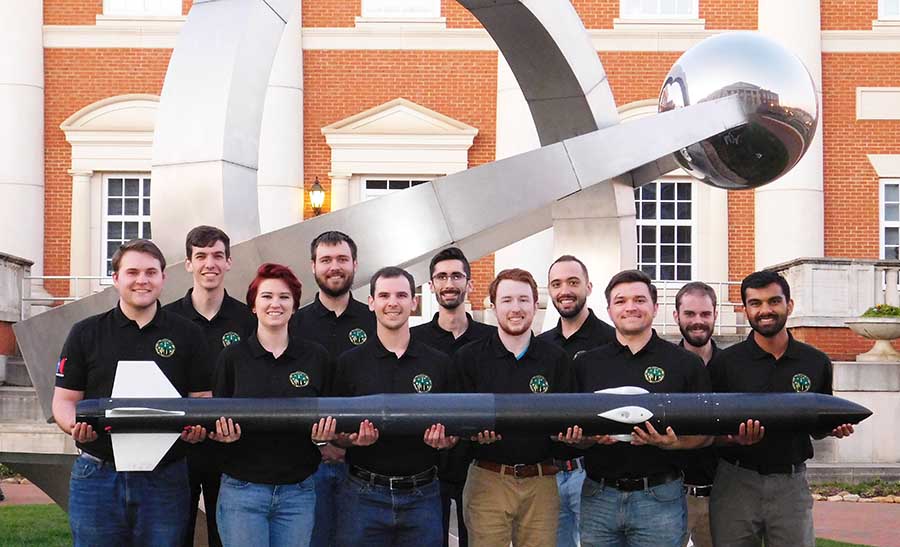
The UNC Charlotte Rocketry team finished second overall and first in the payload portion of the 2020 NASA Student Launch competition. This is the third consecutive year a UNC Charlotte team has been the overall runners-up in this national event.
Although the program was delayed and the annual launch finale event in Huntsville, Alabama, canceled, 54 teams competed remotely in the design, building and testing portions of the competition.
The 2020 NASA competition required college and university teams to design and build rocket and payload systems that would launch to a specified altitude, then after landing deploy a vehicle that would navigate to a designated sample site, retrieve a simulated sample of planetary ice, and navigate at least 10 feet away from the site with the sample stored safely aboard.
In late July, NASA announced virtually the overall and category winners of the competition. The top overall teams were Vanderbilt University, UNC Charlotte and the University of Alabama Huntsville.
The 49er Rocketry Club team was made up of Lee College of Engineering undergraduates from mechanical, systems, electrical and computer engineering, and mechanical engineering technology. Team members were Tyler Ainsworth, David Black, David Clifton, Dan Cornett, Alex Dechant, Aryan Gupta, Samantha McKinney, Jacen Mott, Max Peterson, Gunner Petrea, Jackson Smith and Tyler Watkins.
“This year’s teams showed true innovation and determination as they tackled the new payload challenge and the unconventional methods we had to employ to complete the competition,” said Fred Kepner, an education program specialist and lead for Student Launch at NASA’s Marshall Space Flight Center. “Despite the unique obstacles they faced this year, their commitment to technical excellence and carrying on in the spirit of the competition never wavered.”
Teams earned points for progress and successes during the eight-month competition. Awards were presented in multiple categories including payload design, safety, best social media presence and STEM outreach.
The UNC Charlotte team won the Best Payload Design award. Its payload was a two-part system with the first part detecting the sample retrieval area during the rocket’s decent. The information was then relayed to an unmanned aerial vehicle, which using integrated computer vision and obstacle avoidance navigated to the retrieval area, collected the simulated lunar ice, then moved at least 10 feet away from that site with the sample safely stored.
In the Best Vehicle Design category, the UNC Charlotte team placed third. The category scores teams for the most creative, innovative and well-constructed rocket design for carrying the payload, while maximizing safety and efficiency.
UNC Charlotte also placed third in the Safety Award category, which is given to teams who meet all safety expectations and have the highest-quality documentation of safety designs and procedures.
Read the entire story on the Lee College of Engineering website.
Photo (taken Feburary 2020): The 2020 UNC Charlotte NASA Student Launch team, front row, left to right, Max Peterson, Tyler Ainsworth, David Clifton, Dan Cornett, Tyler Watkins and Aryan Gupta; back row, Jackson Smith, David Black, Gunner Petrea, Jacen Mott and Alex Dechant. Not pictured, Samantha McKinney.